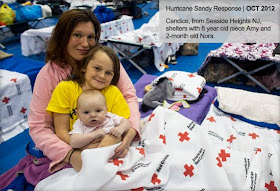
Major disasters catch our attention — and images of Sandy and the destruction it caused continue to cross my path, and to tear at my heart. So what can those of us outside the affected area do? Here are two suggestions, based on my readings and on a recent conversation with Louise Hornor, who has been very involved with Red Cross relief operations through the years.
1. If you're inspired to donate, please donate appropriately.
In most cases, cash works better than anything else, as this video from the National Voluntary Organizations Active in Disaster illustrates, in a low-key way.
FEMA reiterates the message, saying "A financial contribution to a recognized disaster relief organization is the most effective donation to make."
Giving goods can work, IF a well-organized relief effort is asking for specific items, and you're prepared to give exactly what is being requested. Occupy Sandy, which was written up in the New York Times, has used an Amazon.com wedding registry to ask for specific items and get them shipped to the right place.
Where to donate? What are those "recognized disaster relief organizations" that FEMA mentions? I gave my money to the Red Cross, but there are many organizations to choose from. Louise and FEMA both pointed me to National VOAD's list.
2. Do your own disaster preparedness.
Rather than talk about disaster preparedness in general, I'd like to mention three lessons from Sandy.
Number One: That "72 hour" thing is not enough.
Being prepared for 72 hours is a good start, and certainly better than nothing — but ideally, we should be prepared for a significantly longer period. Louise asks this question: "What would your life be like if you had no power for two weeks?" And remember that clean water depends on electricity. Food is easier to find than water, Louise says — so please stock up with lots of water, as well as food.
Looking at the Occupy Sandy wedding registry, I see listings for diapers and tampons — two of the numerous other things, besides food and water, that you'll want to have stockpiled, if applicable to your family.
Number Two: Cold-weather preparedness has its own challenges.
How would you keep warm if you had no power, no heating system? The Red Cross has a winter storm safety checklist (PDF), which provides a good starting point for thinking about cold-weather preparedness.
And then there's this from Joe Cutter of New Jersey 101.5: "Red Cross spokeswoman Gwen Eamer says there are two issues with braving it at home without heat: having enough warm clothing and blankets to keep warm, and knowing when to leave before hypothermia sets in." Eamer also has advice about using space heaters and fireplaces safely.
Number Three: Be careful if you're planning to use a generator!
If you're planning to use a generator — or any other gasoline, propane, natural gas or charcoal-burning device — be sure you know how to use it safely. And please install carbon monoxide alarms! We don't want any more stories of those who died from carbon monoxide poisoning, like this one, this one, this one and this one.
Another possible place to donate, that I was just now reading about: Food Bank for New York City
ReplyDeleteThere was an article in the paper this weekend about appropriate donations, and the need to consult with the organizations on what's needed by them - whether you are giving stuff or time to the recovery. There may have been such articles after other disasters, but somehow I don't recall that it was put quite so plainly.
ReplyDeleteGood advice you're providing about being prepared for an emergency.
ReplyDeleteI should point out that stockpiling enough water for a family for weeks is a difficult chore and will require more than just a few cases of bottled water.
With regards to heat during winter (and light) be very careful of using candles for either as they are typically the biggest cause of fires AFTER a disaster. I know you didn't single them out but I wanted to be sure people know this. There are, in fact, plenty of ways to passively heat a small space to avoid freezing.
Generators, while useful, are another huge potential safety problem. People also tend to find out that (1) they don't have enough fuel stored and (2) their generator doesn't work because it has never been run, maintained, or tested periodically.
Having lived through a 1 in 100 year flood just recently, the issue with donations of goods is that people don't have anywhere for them. If people don't have a home they can't use a bed, which is why its so important to donate what's being asked for. We ran a donation centre and it was hard saying to people "we don't need your stuff", particularly if they then got angry about it.
ReplyDeleteCyclone (hurricane) Yasi was the biggest storm to hit our north in years; came right on top of the floods in the south. Yasi, miraculously caused no direct deaths because it crossed the coast in a relatively unpopulated area. There was just one death, caused by gas poisoning from a generator.
More about giving cash rather than stuff, this time from WBUR & NPR
ReplyDelete